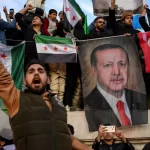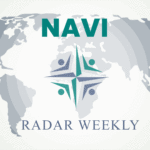Subscribe to NAVI Radar Weekly here
Focus Point: Security and Defense Policy- Defense Discussions
The Enemy Within: Emerging Illiberal Democracies and International Organizations (IOs) | NAVI Research Institute
Umit Kurt| 19.05.2024
How do IOs react to fundamental changes in their wayward members, which diametrically oppose the ideological standings of the organization for the short term and set preventive measures for the long term? In particular, how will organizations like the EU and NATO react to the wave of illiberal democracies forming within, to remain relevant for today, and prepare for the future?”
In conclusion, the emergence of illiberal democracies within international organizations poses a significant challenge to the liberal world order and the foundational principles upon which these organizations were built. As outlined in this study, the response of international organizations, particularly lynchpin entities like the EU and NATO, to such fundamental shifts within their member states is crucial for their continued relevance and effectiveness.
The theoretical frameworks of international relations offer various perspectives on how international organizations function and interact with their member states. From neorealism’s skepticism towards the efficacy of institutions to neoliberalism’s emphasis on their stabilizing role and constructivism’s focus on norms and identities, each framework provides insights into the dynamics at play.
Moreover, the analysis of international organizations through the lens of regime theory and institutional theory highlights the complexities of organizational behavior and the challenges in balancing state interests with institutional objectives. The concept of power, both within and outside of international organizations, underscores the asymmetrical nature of their relationships with member states and the mechanisms through which they exert influence.
In addressing the rise of illiberal democracies within their ranks, international organizations must balance strategic necessity and adherence to core values. While the temptation to prioritize short-term geopolitical concerns may exist, compromising on fundamental principles risks undermining the legitimacy and effectiveness of these organizations in the long run.
One potential avenue for international organizations to counter democratic backsliding is through the strategic application of conditionality, both internally and externally. By linking benefits and privileges to the fulfillment of democratic norms and values, organizations like the EU and NATO can incentivize member states to uphold liberal democratic principles while also demonstrating a commitment to their founding ideals.
In the face of evolving global challenges and internal disruptions, international organizations must remain adaptive and resilient. They must reaffirm their commitment to liberal democratic values while effectively addressing the concerns and grievances of their member states. Only through proactive engagement and principled leadership can these organizations navigate the complexities of the contemporary international landscape and uphold the liberal world order for future generations. Read more…
Focus Point: Security and Defense Policy- Russia-Ukraine War
Bulgarian president says Ukraine’s victory over Russia ‘impossible’ | Euroactiv
Krassen Nikolov| 20.05.2024 | Subscription needed

Ukraine’s victory over Russia is “impossible”
“Every day that this war continues is disastrous for Ukraine, Russia and all of us. This inevitably affects all elections – in Europe, in the USA, and everywhere in the world. We will choose in this and the next election between war and peace. Every citizen is obliged to understand this,” Radev said on Saturday. Read more…
Focus Point: Regional Security- Middle East
International Criminal Court seeks arrest warrants for Netanyahu and Hamas leaders | Politico
Ben Munster | 20.05.2024

The International Criminal Court is seeking arrest warrants against both Israeli Prime Minister Benjamin Netanyahu and Hamas leader Yahya Sinwar in connection with the October 7 attacks and the Gaza war.
ICC Prosecutor Karim A.A. Khan filed applications for the arrests on Monday against the two leaders, as well as the commander of Hamas’s military wing, Mohammed Diab Ibrahim Al-Masri, and Israel’s defense minister, citing allegations of war crimes and crimes against humanity committed in Israel and the State of Palestine. Read more…
Focus Point: Regional Security- Indo-Pacific Security
New Taiwanese president calls on China to stop its threats |Reuters
Yimou Lee and Ben Blanchard| 20.05.2024
Summary
- Taiwan President Lai calls on China to stop threats
- China says inauguration speech sent “dangerous signals”
- Lai inaugurated following January election victory
Taiwan President Lai Ching-te asked China on Monday to stop its military and political threats, saying in his inauguration speech that peace was the only choice and that Beijing had to respect the choice of the Taiwanese people.
China responded by saying Lai had sent “dangerous signals” that sought to undermine peace and stability across the Taiwan Strait.
Lai, addressing the crowd outside the Japanese-colonial-era presidential office in central Taipei, repeated a call for talks with China, which views the proudly democratic island as its own territory and has never renounced the use of force to bring it under Beijing’s control. Read more…
Focus Point: Security and Defense Policy- Russia-Ukraine War
Zelenskyy calls for NATO nations to shoot down Russian missiles over Ukraine | Breaking Defence
Lee Ferran| 21.05.2024
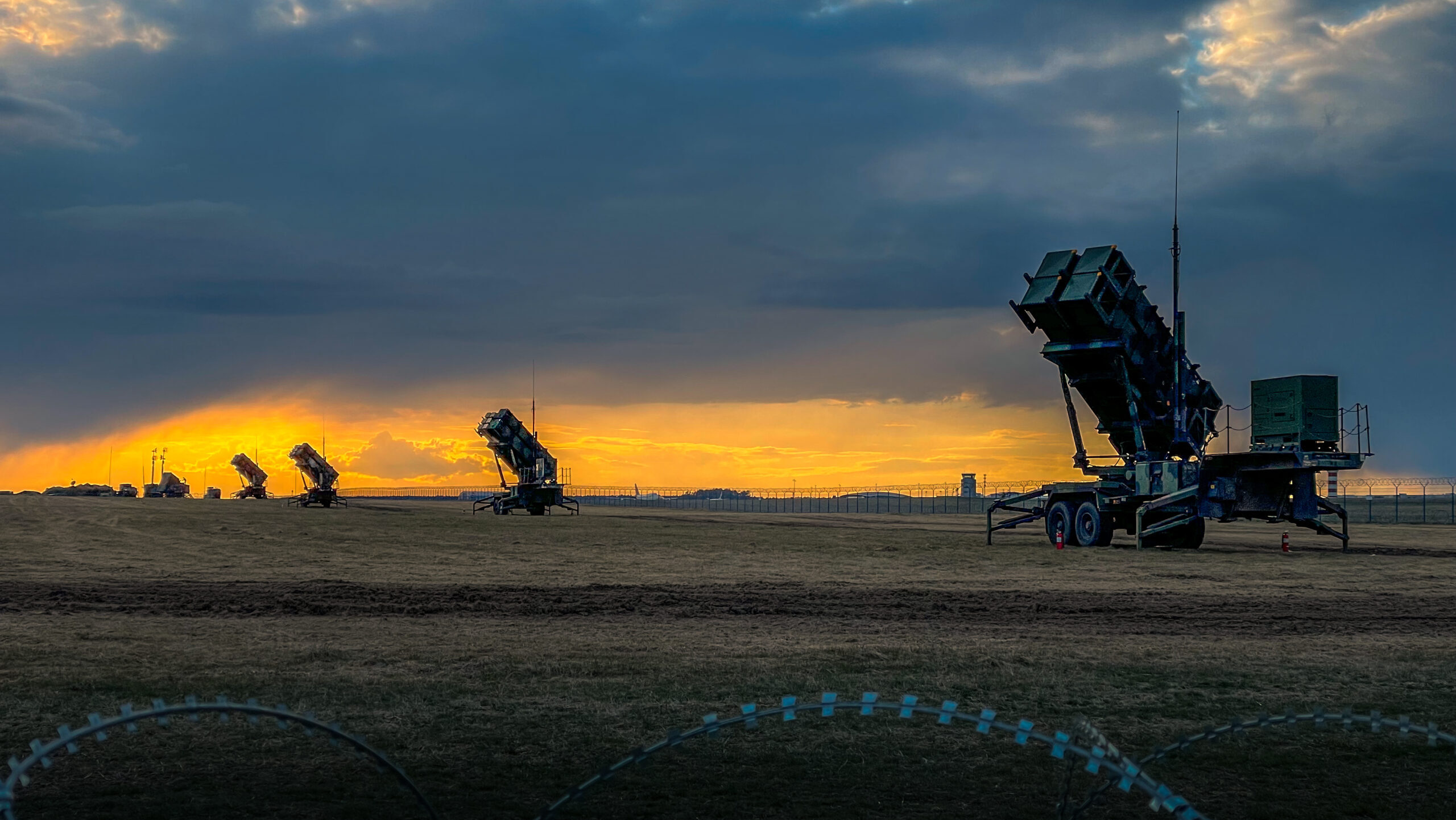
Ukrainian President Volodymyr Zelenkyy’s call for NATO nations to shoot down Russian missiles over Ukraine from their own airspace is likely to find some support in at least a few friendly European capitals, including from a key Finnish lawmaker who told Breaking Defense he liked the idea.
“Why can’t we shoot them down? Is it defense?
In an interview with The New York Times, published today, an animated Zelenksyy asked “what’s the problem” with NATO nations aiding Ukraine’s air defense from within their own borders or airspace.
“Why can’t we shoot them down? Is it defense? Yes. Is it an attack on Russia? No,” he said. “Are you shooting down Russian planes and killing Russian pilots? No. So what’s the issue with involving NATO countries in the war? There is no such issue.”
“Shoot down what’s in the sky over Ukraine,” he added. “And give us the weapons to use against Russian forces on the borders.”
The idea that other countries’ air defenses could reach into Ukraine to protect cities and facilities, especially near Ukraine’s border, has been percolating for a few weeks. In late March Poland’s foreign minister said NATO was discussing shooting down missiles that strayed too close to NATO nations. A German news outlet reported on May 11 that lawmakers in Berlin had discussed using NATO capabilities to protect western Ukraine. Read more…
Focus Point: Regional Security- Transatlantic Security-NATO
Momentum ‘Clearly’ Building for NATO Troops in Ukraine| Newsweek
David Brennan | 22.05.2024 | Subscription needed
The French-led push for deeper NATO involvement inside Ukrainian borders is making headway with European allies, a spokesperson for President Emmanuel Macron’s political party said.
Benjamin Haddad—a member of parliament for Macron’s Renaissance party and considered a leading voice in French foreign policy discussions—told Newsweek on the sidelines of the Lennart Meri Conference in Estonia last week that NATO and the European Union need to “turn the tables” on Russian President Vladimir Putin after more than two years of full-scale war.
Knocking Moscow off balance
Macron is seeking to re-establish Western strategic ambiguity and knock Moscow off balance, with the deployment of NATO forces inside Ukraine in non-combat roles among his recent proposals. Though immediately dismissed by the U.S., the idea has won backers in Europe, particularly in nations that sit along Russian frontiers. Read more…
Focus Point: Regional Security- Middle East
Spain, Ireland and Norway announce they will recognise the State of Palestine | Euronews
Joshua Askew and Mared Gwyn Jones| 22.05.2024
Spain, Ireland and Norway
Three European states — Spain, Ireland and Norway — have announced they will formally recognise the Palestinian state, seven months after the Gaza war broke out.
The highly symbolic move was coordinated between the three nations on Wednesday, following months of negotiations between a group of European countries willing to take the step.
Speaking on Wednesday morning, Spanish Prime Minister Pedro Sánchez — who had vowed to recognise Palestine by June — announced Spain would recognise the State of Palestine next Tuesday, 28 May.
Irish foreign minister Micheál Martin announced on social media platform X that Dublin’s recognition would be official from 28 May as the country moves in tandem with Spain.
Norwegian prime minister Jonas Gahr Stoere also announced his country will formally recognise Palestine as a state earlier on Wednesday. According to Euronews sources, Norway is likely to mimic both Spain and Ireland in making the official recognition effective from 28 May.
Slovenia, Malta and Belgium
European Union member states Slovenia and Malta, in March, signed a joint declaration saying they stand ready to recognise Palestine with their Spanish and Irish counterparts on the margins of a summit in Brusells.
Belgium is also likely to follow suit soon, but refrained from signing the March declaration of intent as it currently holds the six-month rotating Presidency of the Council of the EU, responsible for overseeing its work and therefore likely restricted from signing such declarations.
Belgium’s Deputy Prime Minister Vincent Van Peteghem said on Wednesday that Belgium “must also” recognise the state of Palestine. Read more…
Focus Point: Regional Security- Transatlantic Security-NATO
NATO Ally Responds to Russia’s Move to ‘Adjust’ Baltic Sea Border | Newsweek
David Brennan| 22.05.2024 | Subscription needed
Russia has launched a new “hybrid operation” in the Baltic Sea, according to European Union and NATO member Lithuania, after a Russian Defense Ministry document suggested an adjustment to the country’s maritime claims in the area.
The draft decree, dated May 21, suggests Moscow wants to declare part of the waters in the eastern part of the Gulf of Finland and the area near the Kaliningrad towns of Baltiysk and Zelenogradsk as internal waters.
“The state border of the Russian Federation at sea will change,” a summary of the draft decree quoted by Reuters said. If approved, it added, the decree would come into force in January 2025.
The redrawn borders may affect the maritime zones of both Lithuania and Finland. A spokesperson for the Lithuanian Foreign Ministry told Newsweek that Moscow’s actions “are seen as a deliberate, targeted, escalatory provocation to intimidate neighboring countries and their societies.”
Lithuanian Foreign Minister Gabrielius Landsbergis, meanwhile, wrote on X, formerly known as Twitter: “Another Russian hybrid operation is underway, this time attempting to spread fear, uncertainty and doubt about their intentions in the Baltic Sea. This is an obvious escalation against NATO and the EU, and must be met with an appropriately firm response.” Read more…
Focus Point: Regional Security- Transatlantic Security-Western Balkans
UN approves annual commemoration of 1995 Srebrenica genocide | Euronews
Euronews with AP | 23.05.2024
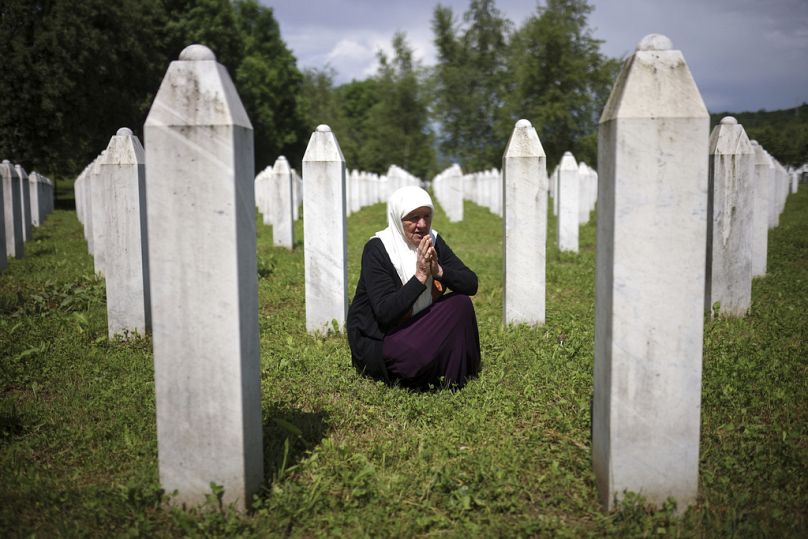
Supporters of the measure, backed by Germany and Rwanda, say it is necessary so that the massacre is not denied or forgotten, while Serbs fear being unfairly labelled as supporters of genocide.
The United Nations General Assembly has approved a resolution to commemorate the 1995 Srebrenica genocide in Bosnia annually, over strong opposition from Serbs in Bosnia and neighbouring Serbia.
July 11 as the “International Day of Reflection and Commemoration of the 1995 Genocide in Srebrenica
Proponents of the measure sponsored by Germany and Rwanda say it is necessary so that the massacre is not denied or forgotten.
The vote in the 193-member General Assembly was 84-19 with 68 nations abstaining, a reflection of concerns among many countries about the impact of the vote on reconciliation efforts in deeply divided Bosnia.
The resolution designates July 11 as the “International Day of Reflection and Commemoration of the 1995 Genocide in Srebrenica,” to be observed annually starting in two months. Read more…
Focus Point: Regional Security- Transatlantic Security-NATO
NATO holds first meeting of Critical Undersea Infrastructure Network | NATO
NATO | 23.05.2024
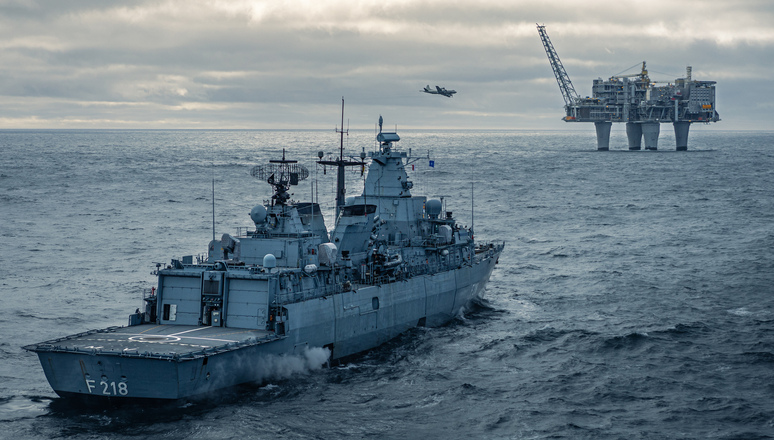
Leading experts from across the Alliance met at NATO Headquarters on Thursday (23 May 2024) for the first meeting of NATO’s new Critical Undersea Infrastructure Network. With rising challenges to undersea infrastructure, the Alliance is putting in place new tools to enhance the security of undersea cables and pipelines and to monitor potential threats.
The one-day meeting follows the decision by NATO Defence Ministers in February 2024 to stand up the Critical Undersea Infrastructure Network. Allies are also establishing a Maritime Centre for the Security of Critical Undersea Infrastructure within NATO’s Maritime Command (MARCOM) in Northwood, UK. Thursday’s meeting was chaired by David van Weel, Assistant Secretary General for Innovation, Hybrid and Cyber. Industry representatives, including energy operators, also attended. Read more…
Focus Point: Regional Security- Indo-Pacific Security
China holds military drills around Taiwan as ‘strong punishment’ |BBC
Kelly Ng and Rupert Wingfield-Hayes| 23.05.2024
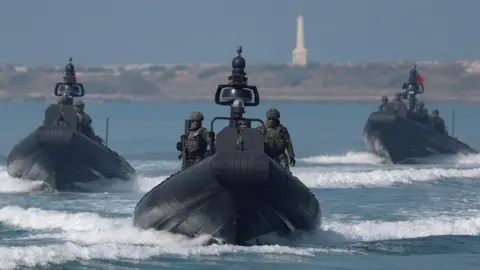
China has started two days of military exercises around Taiwan, with its military calling them “strong punishment” for the self-ruled island’s “separatist acts”.
The drills come three days after the inauguration of President William Lai, who called on China to stop threatening the island and accept the existence of its democracy.
China sees Taiwan as a breakaway province that will eventually be under Beijing’s control, but the island sees itself as distinct.
Taiwan’s defence ministry condemned the Chinese drills as “irrational provocations”.
Taipei dispatched naval, air, and ground forces to “defend the [island’s] sovereignty”, its defence ministry said.
Thursday’s drills for the first time simulated a full-scale attack, Taiwanese military experts said, rather than an economic blockade.
The exercises took place all around the main island, and for the first time also targeted the Taipei-controlled islands of Kinmen, Matsu, Wuqiu and Dongyin which lie close to the Chinese coast, according to maps released by China’s People’s Liberation Army (PLA).
China and Taiwan – the basics
– Why do China and Taiwan have poor relations? China sees the self-ruled island as a part of its territory and insists it should be unified with the mainland by force if necessary. Taiwan sees itself as distinct.
– How is Taiwan governed? The island has its own constitution, democratically elected leaders, and about 300,000 active troops in its armed forces.
– Who recognises Taiwan? Only a few countries recognise Taiwan. Most recognise the Chinese government in Beijing instead. The US has no official ties with Taiwan but does have a law which requires it to provide the island with the means to defend itself. Read more…
Focus Point: Security and Defense Policy- Russia-Ukraine War
Top Russian military officials are being arrested. Why is it happening? | AP
Emma Burrows | 24.05.2024 | A Must Read
It began last month with the arrest of a Russian deputy defense minister. Then the head of the ministry’s personnel directorate was hauled into court. This week, two more senior military officials were detained. All face charges of corruption, which they have denied.
The arrests began after President Vladimir Putin began his fifth term and shuffled his ally, longtime Defense Minister Sergei Shoigu, into a new post.
It immediately raised questions about whether Putin was reasserting control over the Defense Ministry amid the war in Ukraine, whether a turf battle had broken out between the military and the security services, or whether some other scenario was playing out behind the Kremlin’s walls.
A look at what’s behind the arrests and why they are happening
More arrests are likely as the new defense minister wants to show “there is a price to be paid” for corruption in order to rein it in, Connolly said.
Because the system is built on corruption!
Greene added that it’s also possible that “entrepreneurial” investigators will think launching a criminal case against a general is a great opportunity for career advancement.
Because corruption is so endemic, however, it could cause panic in the whole system.
If officials are arrested for behavior that previously was allowed even though it was illegal, it could shift the “red lines,” Greene said.
If the arrests continue or widen beyond the Defense Ministry, it could cause finger-pointing and for officials to “rush for the exits,” he said, and that is something the Kremlin wants to avoid.
Because the system is built on corruption, Greene said, attacking it too hard could cause it to “fall apart.” Read more…
Focus Point: Regional Security- Transatlantic Security-NATO
Hungary seeks to ‘redefine’ its NATO membership over Ukraine | Financial Times
Marton Dunai| 24.05.2024 | Subscription needed

Hungarian Prime Minister Viktor Orbán said he was seeking to “redefine” the terms of Nato membership due to his long-standing opposition to aiding Ukraine against Russia’s war. “Our lawyers and officers are working [to define] how Hungary can exist as a Nato member without taking part in Nato operations outside Nato territory,” Orbán told national radio on Friday. The Hungarian leader has refused to send military aid to Kyiv and has repeatedly delayed EU sanctions on Russia in response to Moscow’s full-scale invasion of Ukraine. He is also adamantly opposed to Nato training Ukrainian soldiers in Ukraine. Read more…
Focus Point: Security and Defense Policy- Russia-Ukraine War
NATO’s boss wants to free Ukraine to strike hard inside Russia | The Economist
The Economist | 24.05.2024| Subscription needed

ens Stoltenberg says the rules on using Western weapons should be eased
NATO Secretaries-General do not normally attack the policies of the alliance’s biggest and most important member country. But Jens Stoltenberg, whose ten-year stint in charge is coming to an end, has done just that. In an interview with The Economist on May 24th, he called on nato allies supplying weapons to Ukraine to end their prohibition on using them to strike military targets in Russia. Mr Stoltenberg’s clear, if unnamed, target was the policy maintained by Joe Biden, America’s president, of controlling what Ukraine can and cannot attack with American-supplied systems. Read more…
The NAVI Research Institute is the research division of NATO Veterans Initiative - NAVI that provides a unique perspective to transatlantic leaders and societies on peace and security through the lens of NATO's founding principles of rule of law, democracy, human rights, and individual liberties. The NAVI Research Institute was officially established by the NAVI Board on July 16th, 2023.
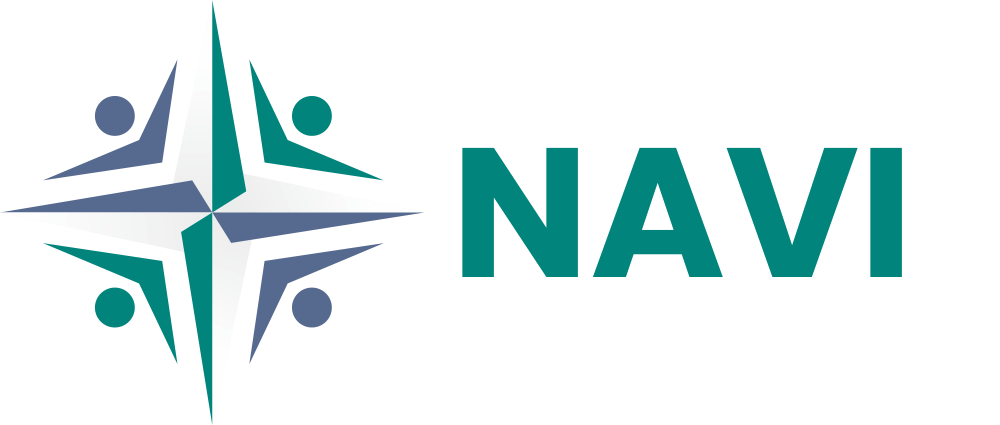
![NAVI-PROJE-[Recovered] Radar Weekly](https://nato-veterans.org/wp-content/uploads/2024/05/NAVI-PROJE-Recovered-696x392.gif)

